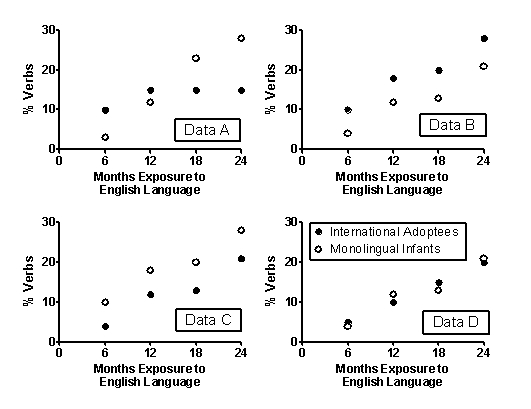Multiple Choice
Scenario I
Scenario I is based on and presents results consistent with the following studies:
Snedeker, J., Geren, J., & Shafto, C. L. (2012) . Disentangling the effects of cognitive development and linguistic expertise: A longitudinal study of the acquisition of English in internationally-adopted children. Cognitive Psychology, 65(1) , 39-76. doi:10.1016/j.cogpsych.2012.01.004
Snedeker, J., Geren, J., & Shafto, C. L. (2007) . Starting over: International adoption as a natural experiment in language development. Psychological Science, 18(1) , 79-87. doi:10.1111/j.1467-9280.2007.01852.x
Language development occurs in orderly stages, beginning with one-word utterances and progressing to two-word utterances, simple sentences containing function morphemes, and the emergence of grammatical rules. Psycholinguists have attempted to determine if language development is a consequence of cognitive development or if it reflects linguistic processes that occur independently of general cognitive development. Studies on the acquisition of a second language in internationally adopted children have provided insight into this research question. In a series of studies, Snedeker et al. (2007, 2012) studied the acquisition of the English language in adopted preschoolers from China. These children had no exposure to the English language before being adopted by families in the United States.
Figure 9.1 
-(Scenario I) Which is the BEST reason why the research question posed in Scenario I could not be answered by studying infants' acquisition of the English language and comparing it to infants' acquisition of the Spanish language in American-born bilingual homes?
A) Language and cognitive development remain confounded in these groups.
B) The two groups differ on many potential third variables that could affect rates of language acquisition.
C) English and Spanish are too similar linguistically for meaningful differences in language acquisition to occur.
D) The linguistic expertise of the parents in the two groups may differ.
Correct Answer:

Verified
Correct Answer:
Verified
Q1: Scenario II<br>Scenario II is based on and
Q2: Use the following to answer questions <br>Scenario
Q2: Scenario I<br>Scenario I is based on and
Q4: Scenario I<br>Scenario I is based on and
Q5: Scenario II<br>Scenario II is based on and
Q7: Scenario I<br>Scenario I is based on and
Q7: Use the following to answer questions <br>Scenario
Q8: Scenario II<br>Scenario II is based on and
Q10: Scenario I<br>Scenario I is based on and
Q11: Scenario I<br>Scenario I is based on and